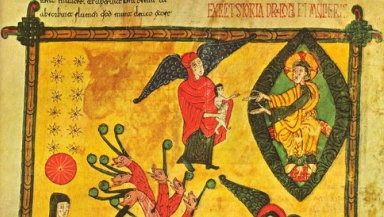
There are parts of the Bible which, if they're honest, preachers tend to shy away from. Some of them are too hard, some of them are too confusing and some are too odd. That's particularly true for parts of the Old Testament, but the New Testament has its challenges too.
Here are five verses your pastor has probably never preached on – at least, not willingly.
1. Matthew 1:1-17
It's just before the Christmas story begins, so Christmas is the natural place for it – but it's just a long list of names, fascinating to a first-century Jew but probably less so for us. So the chances are your pastor skips over it to Mary and Joseph. It's challenging, to be sure – even pronouncing all those Hebrew names is beyond some of us – but there is at least one good sermon in there and probably more. A clue: look at the women who are mentioned and try to work out why.
2. Acts 19:11-12
This one's agonisingly difficult for Protestants, but far less so for Catholics and Orthodox Christians, who are much more at ease with relics. Handkerchiefs and aprons that had touched Paul's body were taken to sick people and they got better. For a good evangelical, that sort of thing just isn't meant to happen – it's all a bit of mediaeval mumbo-jumbo. Awkward, then, to find such a clear testimony to it in Scripture...
3. Acts 20:7-12
Now, this one's just embarrassing. Most preachers have sent people to sleep in their evening services. It's disconcerting and a bit depressing, but perhaps they've just had a tiring day. We don't like to be reminded of it, though, and that's what this story is about: Eutychus, a young man (and teenagers need their sleep) was sitting in a window as Paul talked "on and on" and fell out when he dozed off.
4. James 2:26
"As the body without the spirit is dead, so faith without deeds is dead." This is the theme of the chapter, and indeed of much of the book. It's one of those verses that many evangelicals feel they have to explain away: after all, we are saved by faith, not by works, and we don't have to earn our way to heaven. This is the thinking that led Martin Luther to wish the book wasn't in the Bible at all ("an epistle of straw", he called it). But it is: and perhaps we should be more willing to admit that you can't separate what you believe from what you do.

5. Most of Revelation
Now, there are some churches which have Revelation and other apocalyptic books as a weekly diet. Most pastors, however, probably limit themselves to the Letters to the Seven Churches (2-3), and perhaps the bits from the end about the New Jerusalem. Everything else is in the "too difficult" box.
And there's no denying it's challenging, all those dragons and beasts and plagues. But with the help of a couple of well-balanced commentaries and a modicum of common sense, it shouldn't be entirely beyond a diligent preacher.
Mark Woods is the author of Does the Bible really say that? Challenging our assumptions in the light of Scripture (Lion, £8.99). Follow him on Twitter: @RevMarkWoods













